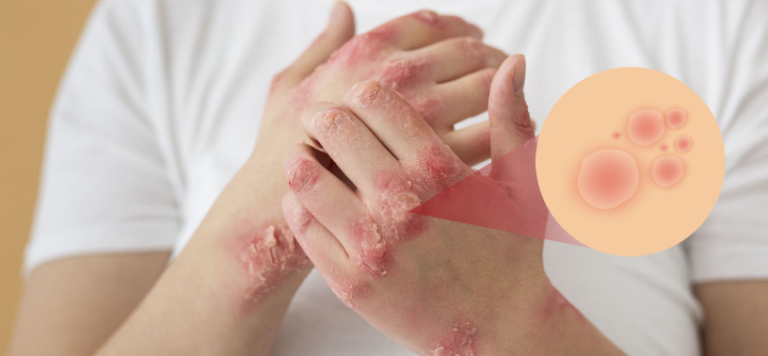Psoriasis is a chronic autoimmune condition that accelerates skin cell production, leading to thick, scaly patches on the skin. While it is not contagious, it can significantly impact a person’s quality of life. Managing psoriasis effectively involves understanding its causes, symptoms, and treatment options.
What is Psoriasis?
Psoriasis is a condition where skin cells multiply up to ten times faster than normal. This overproduction leads to an accumulation of cells on the skin’s surface, forming inflamed, red, or purplish patches covered with silvery or gray scales. The condition commonly affects areas such as the scalp, elbows, knees, and lower back, though it can appear anywhere on the body.
Types of Psoriasis
1. Plaque Psoriasis (Most Common Type)
Plaque psoriasis presents as raised, inflamed, and scaly lesions. It varies in appearance depending on skin tone:
- Light skin: Red patches with silver-white scales.
- Medium skin: Coral-colored plaques with silver scales.
- Dark skin: Dark brown or purple plaques with gray scales.
2. Pustular Psoriasis
This type appears as white, pus-filled blisters surrounded by inflamed skin. It is more common in adults and can cover large areas, causing intense discomfort.
3. Guttate Psoriasis
Often triggered by infections like strep throat, this type manifests as small, drop-like lesions. It is more common in children and young adults.
4. Inverse Psoriasis
Develops in skin folds such as the armpits, groin, and under the breasts. It appears as smooth, shiny lesions without scales, often aggravated by sweating and friction.
5. Erythrodermic Psoriasis (Rare & Severe)
This is a life-threatening form that causes widespread redness, scaling, and peeling, often accompanied by fever and severe discomfort.
Causes and Risk Factors
Psoriasis is an immune system disorder that can be triggered by several factors, including:
- Genetics: A family history increases the likelihood of developing psoriasis.
- Infections: Bacterial and viral infections can provoke flare-ups.
- Stress and Anxiety: High stress levels can trigger or worsen symptoms.
- Climate Conditions: Cold, dry weather often aggravates the condition.
- Lifestyle Factors: Smoking, alcohol consumption, and obesity can exacerbate symptoms.
- Medications: Certain drugs like beta-blockers, NSAIDs, and lithium may trigger psoriasis.
Symptoms of Psoriasis
Psoriasis symptoms vary in severity but commonly include:
- Thick, raised, and inflamed patches of skin.
- Silvery-white, gray, or red scaling.
- Cracked skin that may bleed.
- Itching, burning, and soreness.
- Pitted, thickened nails.
- Joint pain (in cases of psoriatic arthritis).
Diagnosis of Psoriasis
A healthcare provider can diagnose psoriasis through:
- Physical Examination: Identifying characteristic plaques on areas like the scalp, knees, elbows, and nails.
- Skin Biopsy: A sample may be taken to rule out other conditions.
Treatment and Management
While there is no cure, several treatment options help control symptoms:
1. Topical Treatments
- Moisturizers to prevent dryness.
- Corticosteroid creams to reduce inflammation.
- Vitamin D and retinoid creams to slow skin cell growth.
- Medicated shampoos for scalp psoriasis.
2. Phototherapy
- Light therapy (UVB) slows skin cell growth and reduces inflammation.
- PUVA (psoralen plus ultraviolet A) treatment is effective for severe cases.
3. Systemic Medications
For moderate to severe psoriasis, oral or injectable medications may be prescribed:
- Methotrexate
- Cyclosporine
- Biologics (such as adalimumab and etanercept)
4. Lifestyle and Home Remedies
- Regular moisturizing to prevent dryness and cracking.
- Reducing stress through yoga and meditation.
- Avoiding known triggers like smoking and excessive alcohol.
- Maintaining a healthy diet rich in anti-inflammatory foods.
Prevention Strategies
- Avoid triggers: Identify and minimize factors that worsen symptoms.
- Manage stress: Incorporate relaxation techniques into your routine.
- Follow a balanced diet: Eating healthy reduces inflammation.
- Regular skincare: Use gentle, fragrance-free products.
- Exercise: Helps maintain a healthy immune system and weight.
Complications of Psoriasis
If left untreated, psoriasis can lead to severe health complications, including:
- Psoriatic Arthritis: A painful condition affecting joints.
- Mental Health Issues: Anxiety and depression are common.
- Cardiovascular Diseases: Increased risk of heart disease.
- Metabolic Syndrome: Associated with diabetes and obesity.
- Eye Diseases: Increased risk of conjunctivitis and uveitis.
Psoriasis is a lifelong condition, but with the right approach, flare-ups can be managed effectively. Seeking medical advice, making lifestyle adjustments, and following treatment plans are key to maintaining healthy skin and improving overall well-being.
For more health-related insights and news, visit Nepal Monitor.


